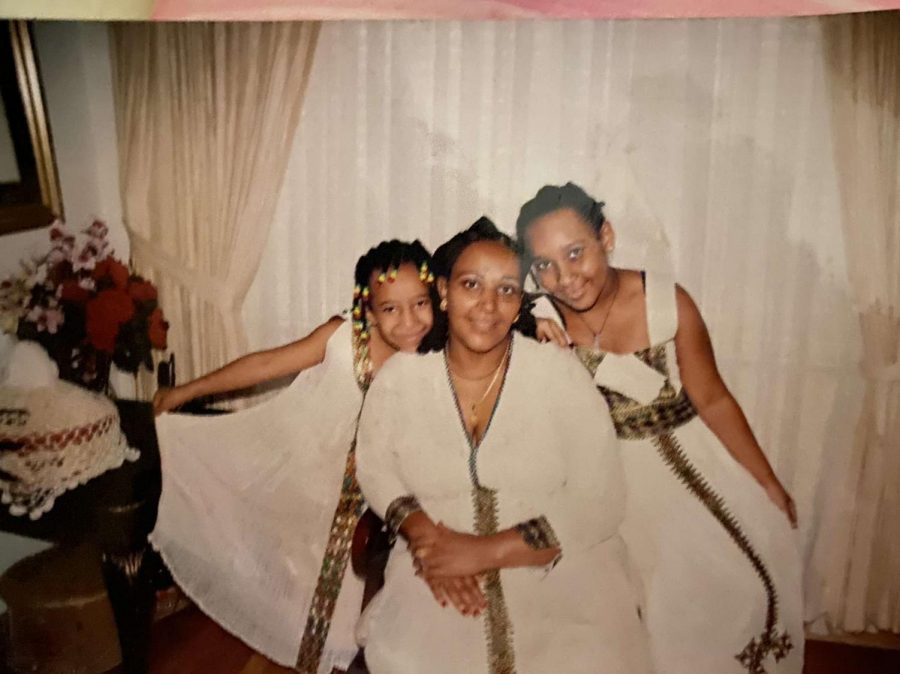The hidden responsibilities of bilingual children
Courtesy Hasset Asfaw
Senior Hasset Asfaw (right) often had to translate for her parents when she was younger.
May 18, 2021
Ritenour is amongst the most diverse school districts around the St Louis Metropolitan area, providing education to students from all ethnic backgrounds who often juggle multiple languages as they bounce between their home and school life.
Many students bear a huge weight on their shoulders from the difficulty within English texts or conversations that they are needing to translate for the families. Most of the time this task falls on the eldest child, who often needs to mature quickly to be able to hold and recite difficult English for their struggling families.
Besides knowing how to translate, there is an underlying struggle when it comes to translating in a professional setting at a young age. Coming in contact with difficult legal and medical terminology for bilingual students is not an abnormal obligation that often arises.
Senior Hasset Asfaw has experienced the pressure of translating difficult texts at a young age for her parents. Asfaw’s parents are from Ethiopia and everyone in the household has Amarhic as their first language. Asfaw shared her younger self’s frustrations in regards to attempting to assist her parents to understand the information shared by other adults.
“It was frustrating at times, I have always been translating for my parents, stretching back to the middle of elementary school and although it made me feel pretty cool like hey I know best of both worlds, it got really complicated,” Asfaw said. “There were even times where I was not taken seriously because of my age, like at a doctor’s office or car shop. I was a nine-year-old speaking for adults. My parents didn’t like when they were given a translator, but in some circumstances, I legally couldn’t speak for them.”
Senior Annie Le began to play the role of translator for her family at a very young age. Le’s family is completely fluent in Vietnamese and able to hold a small conversation in English, but still struggle when it comes to complexity within the English language. The bilingual student was able to give her perspective on the act of translating in America,
“Personally it was not hard balancing the two languages. It was a matter of code-switching. Vietnamese was spoken at home and English was spoken and taught at school,” Le said.
Although Le commented that it was fairly manageable to play this role of translator, she did say that there are some differences in languages that can make the process more difficult.
“At times I would find myself having to think ‘harder’ about translating certain things. For example, if I memorize a phone number in Vietnamese, I can say it super fast, but when asked to say it in English, I would have to stop and think about it and translate each number. It was not impossible or ‘difficult’ necessarily, it just required me to think a little bit harder,” Le said.
Senior Monserrat Rico kept her household running through the power of translating from English to Spanish for her parents, who knew very little English when she was young.
“It was very difficult to juggle two languages because my own learning process was very slow. Even after I started to understand and speak English a bit more I would stutter a lot. Juggling the two was very confusing because once I got to school the Spanish had to go away and vice versa,” Rico said.
It has been a difficult task to balance being the “head of the household” and keeping up with her education, but it has definitely been possible for these bilingual students. Rico has ultimately been able to break through the language barrier to ensure that her family has gotten the correct information throughout the years.
Schools have continued to accommodate struggling bilingual students by offering extra aid through certain in-school special programs. The special English Language Learner (ELL) programs are able to provide specific attention to single students to ensure that they are not left behind due to the language barrier. Ritenour has even created a whole new school for non-English speaking students, through the International Welcome Center.
Many households in the Ritenour area whose families have immigrated here from another country hold the same issues. It takes special skill to be able to learn multiple languages at a young age while using higher-level vocabulary that is often needed when translating.
“I’ve been doing it for as long as I can remember. I probably started translating for them since I began reading. I feel multiple things when translating to my parents,” Le said. “I feel proud that I am able to help them with something that they don’t quite understand, but sometimes I feel a bit of frustration, especially when certain words and phrases don’t have perfect translations.”
Asfaw said that while the experience has been difficult, it gives her a unique perspective about being a bilingual individual in the world.
“I feel like I am more patient than the average individual and I think I have a superpower of hearing perfect sentences through thick accents,” Asfaw said. “ It gave me a respect for bilingual people and how hard they are working to learn such a difficult and foreign language to them, let alone living within a country you barely understand.”




